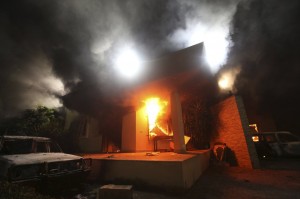Benghazi Interviews Show Militia and Insults to Islam Fueled Attack — No Qaeda Link Seen
< < Go Back
by David Kirkpatrick,
The reality behind the deadly attack on American outposts in Libya is murkier and more complex than initially believed.
Months of investigation by The New York Times, centered on extensive interviews with Libyans in Benghazi who had direct knowledge of the attack there and its context, turned up no evidence that Al Qaeda or other international terrorist groups had any role in the assault. The attack was led, instead, by fighters who had benefited directly from NATO’s extensive air power and logistics support during the uprising against Colonel Qaddafi. And contrary to claims by some members of Congress, it was fueled in large part by anger at an American-made video denigrating Islam.
A fuller accounting of the attacks suggests lessons for the United States that go well beyond Libya. It shows the risks of expecting American aid in a time of desperation to buy durable loyalty, and the difficulty of discerning friends from allies of convenience in a culture shaped by decades of anti-Western sentiment. Both are challenges now hanging over the American involvement in Syria’s civil conflict.
The attack also suggests that, as the threats from local militants around the region have multiplied, an intensive focus on combating Al Qaeda may distract from safeguarding American interests.
In this case, a central figure in the attack was an eccentric, malcontent militia leader, Ahmed Abu Khattala, according to numerous Libyans present at the time. American officials briefed on the American criminal investigation into the killings call him a prime suspect. Mr. Abu Khattala declared openly and often that he placed the United States not far behind Colonel Qaddafi on his list of infidel enemies. But he had no known affiliations with terrorist groups, and he had escaped scrutiny from the 20-person C.I.A. station in Benghazi that was set up to monitor the local situation. Mr. Abu Khattala, denies participating in the attack.
To this day, some militia leaders offer alibis for Mr. Abu Khattala. All resist quiet American pressure to turn him over to face prosecution. Last spring, one of Libya’s most influential militia leaders sought to make him a kind of local judge.
Fifteen months after Mr. Stevens’s death, the question of responsibility remains a searing issue in Washington, framed by two contradictory story lines.
One has it that the video, which was posted on YouTube, inspired spontaneous street protests that got out of hand. This version, based on early intelligence reports, was initially offered publicly by Susan E. Rice, who is now Mr. Obama’s national security adviser.
The other, favored by Republicans, holds that Mr. Stevens died in a carefully planned assault by Al Qaeda to mark the anniversary of its strike on the United States 11 years before. Republicans have accused the Obama administration of covering up evidence of Al Qaeda’s role to avoid undermining the president’s claim that the group has been decimated, in part because of the raid that killed Osama bin Laden.
The investigation by The Times shows that the reality in Benghazi was different, and murkier, than either of those story lines suggests. Benghazi was not infiltrated by Al Qaeda, but nonetheless contained grave local threats to American interests. The attack does not appear to have been meticulously planned, but neither was it spontaneous or without warning signs.
More From The New York Times:




